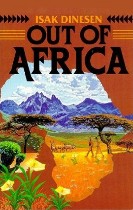 Isak Dinesen •
Isak Dinesen •
Out of Africa •
Dinesen’s writing haunts. She has the rare gift of pulling a reader completely into her experience, transporting you to 1920s Kenya, where she struggles to run a coffee plantation. The dust chokes you; the rainy season quenches your spirit; witchcraft hovers in the air.
Her time in Africa bears the quality of myth. Fire, illness, loss seem not to occur haphazardly, but to be visited on her by the gods. Dinesen perceives the pattern behind the individual pieces, and deftly spreads it out for us to see also.
Her house becomes “a communist establishment” for her friends Denys Finch-Hatton and Berkeley Cole. “Everything in it was theirs, and they took a pride in it, and brought home the things they felt to be lacking.” Finch-Hatton keeps his books and gramophone there; Cole drinks a bottle of champagne in the forest every morning, insisting on the best crystal. She charms them both with her intricate storytelling—as evidenced in the tale of Lulu, a rescued gazelle who takes up residence on the farm.
“Nobody could be of a gentler demeanour than Lulu was when she came and lay down, in the manner of a perfect lady who demurely gathers her skirts about her and will be in no one’s way. She drank the milk with a polite, persnickety mien, as if she had been pressed by an overkind hostess. She insisted on being scratched behind the ears, in a pretty forbearing way, like a young wife who pertly permits her husband a caress.”
Like Beryl Markham, Dinesen gives herself over to the potent mysticism of this land. If Mma Ramotswe’s Africa bustles with tooting minivans, Dinesen’s resounds to tribal chants under a full moon. You will hear them in memory long after you close the book.





Your email address will not be published.